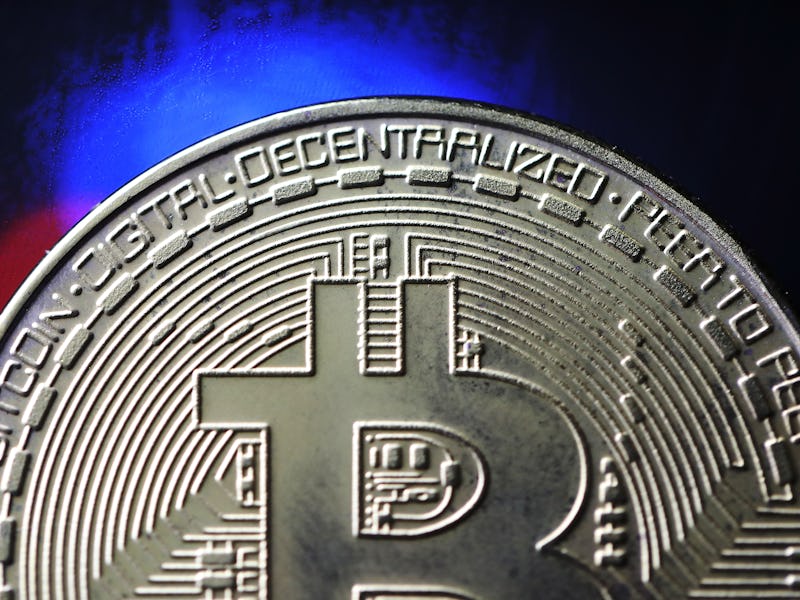Why Bitcoin Diehards Hate the Sudden Ripple Surge
The centralization debate pushes on.

A storm is brewing in the cryptocurrency community. Bitcoin, which for many people is almost synonymous with crypto, has faced strong competition from Ripple, a token created by the company of the same name that aims to facilitate transfers between major financial corporations. And the bitcoin community is growing tired of what this newcomer represents.
“For the most part, I’m not frustrated or angry with Ripple, I’m frustrated with the community’s general lack of knowledge these days (i.e. Ripple is a symptom, but not the problem itself),” Reddit user thieflar, a moderator of the bitcoin subreddit, tells Inverse.
The main issues stem from Ripple’s more centralized structure. When the system was created in 2013, the development team removed many of the key features you find in most other cryptocurrencies. Some of these decisions make sense for a product geared toward major financial institutions, but it does draw into question the value of comparisons between Ripple and Bitcoin.
Bitcoin incentivizes people to dedicate computer resources to powering the network by rewarding them with cryptocurrency. To avoid a situation where “Bitcoin miners” have a stake in the network’s operation, Ripple instead issues tokens itself, transforming the company’s role into something more akin to a central bank. Investopedia notes that because the company already created all the 100 billion XRP tokens (holding around 62 percent of those for itself), it doesn’t accumulate value like other deflationary assets where the supply increases.
The centralized nature of Ripple came to a head in 2015. Crypto token exchange Bitstamp filed a complaint after Ripple Labs tried to purchase nearly 100 million XRP. The company sought to buy tokens that founder Jed McCaleb put up for sale. McCaleb had an agreement with his company that, after leaving, he could only sell $10,000 of XRP per week for the first year. Bitstamp became the middleman in a dispute between XRP’s manager and its former founder.
“The fact that Ripple is labeled as a “cryptocurrency” and included on sites like CoinMarketCap has been, for the most part, seen as misleading and inaccurate for many years now,” thieflar says.
This has been the mantra of the community, but people are not listening. Charlie Lee, creator of Litecoin, has said that Ripple is “not a cryptocurrency.”
Cryptocurrency writer Joseph Young has also warned about the company’s control over XRP:
Ripple advocates note Bitcoin is centralized in its own way. Around 40 percent of bitcoins are held by 1,000 people, leading to a mass centralization of the market. On top of this, the mining system that manages consensus could potentially lead to a form of centralization, as miners group together and choose which upgrades to adopt and which ones to abandon.
“Control is not a bad things,” Reddit user Jarabino said in the Ripple subreddit, in response to an article that accused XRP of not being a cryptocurrency. “It’s only an abusive control that is bad.”
Centralized or not, Ripple has made big headlines thanks to a soaring valuation on coin-watching websites. CoinMarketcap lists Ripple as the third-largest cryptocurrency, with a price of $2.01 per XRP and a circulating supply of nearly 40 million XRP. This produces a market cap of $77.7 billion, a fraction of Bitcoin’s $245.9 billion but a sizeable valuation nonetheless.
Bitcoin advocates, however, argue that Ripple’s market cap is a poor measure of value, due to the company’s control over supply.
“It seems like the multiple-year-long cryptocurrency bull-market eventually reached a point where newcomers have been buying indiscriminately, not understanding anything about what they are buying other than “it’s a crypto coin so you can make money with it”, and Ripple managed to get caught up in the madness,” thieflar says.
As for Ripple’s stance on all this? The company is clear that XRP is not meant to be an investment in the same way others may treat bitcoin:
Private exchanges and liquidity providers may choose to hold additional XRP for trading. Ripple (the company) does not promote XRP as a speculative investment.
Whether its centralized structure is an issue is a whole other matter.